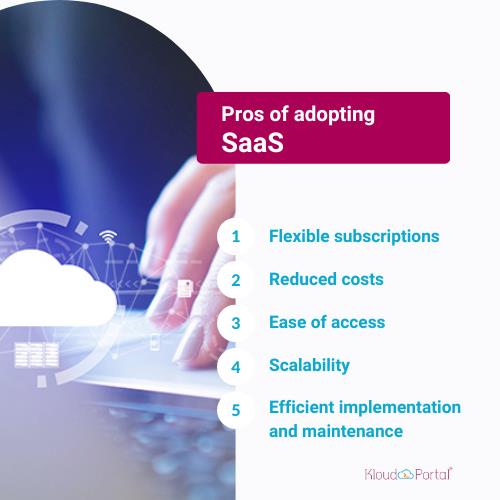The focus of this article is to explore the definition of SaaS, its advantages for organizations, the obstacles it poses, as well as popular use cases and up-and-coming technologies.
To analyze, evaluate, and design cloud computing solutions, it is crucial to understand the different types of cloud computing services, such as Infrastructure as a service (IaaS), Platform as a service (PaaS), and SaaS. SaaS offers organizations numerous advantages, including flexibility and cost savings. Let SaaS market vendors handle tasks such as software licensing, software maintenance, project management, and employees can concentrate on other priorities.
Product marketing is critical in ensuring that the SaaS product is successful. Since SaaS applications/products are delivered over the Internet, they require a different marketing approach than traditional software products. Software as a service (SaaS) essentially extends the idea of the Application Service Providers model.
What We Cover In This Blog?
SaaS Deployment Models
SaaS can be deployed in three models:
Private Cloud: A single organization comprising multiple consumers uses cloud software running on infrastructure that is provisioned for their exclusive use. The physical location of the infrastructure may be on or off the premises. The ownership, management, and operation of the infrastructure can be carried out by either the organization, a third party, or both.
Public Cloud: The cloud software is built on IT infrastructure that is provisioned for open use by the public. The infrastructure may be under the ownership, management, and operation of a business, academic or government organization, or a combination of them, and is located on the cloud providers’ premises.
Hybrid Cloud: The cloud software delivery model is primarily built on one type of infrastructure, but can switch to another in times of high demand. Standardized or proprietary technology enables data centers and application portability.
What Are The Pros And Cons Of Businesses Adopting SaaS?
In today’s cloud market, businesses prefer SaaS applications due to ease of use, higher convenience, flexibility, and accessibility. These factors have made SaaS applications increasingly popular among organizations seeking to streamline their activities and enhance their workflow efficiency. All we need is an internet browser and an internet connection.
SaaS providers handle all the technical issues, eliminating the need for in-house IT expertise. As companies continue to embrace cloud computing, SaaS solutions are gaining traction. Although certain users are capable of independently provisioning SaaS technology, others necessitate third-party aid for integrating, customizing, and ensuring security.
Let’s explore some advantages and disadvantages of adopting SaaS in businesses.
Pros of adopting SaaS:
1. Flexible subscriptions: Software as a Service replaces the traditional software method of purchasing on-premises software with a subscription model that can meet customers’ individual needs. Most commonly, subscriptions are paid monthly, quarterly, or annually, providing a recurring operating expense that can be modified based on evolving operating costs.
2. Reduced costs: Customers can enjoy lower initial costs by replacing the licensing costs associated with purchasing software with more flexible subscription fees. Allows companies to focus their investments on operating systems expenses rather than capital expenditures. Additionally, since SaaS providers manage the IT infrastructure that administers the software, customers have reduced reliance on hardware and software updates, resulting in lower costs.
3. Ease of access: SaaS business apps, being cloud-based, only require an internet connection, browser, mobile access, and user authentication, making them easily accessible from anywhere at any time. This convenience saves time and effort, decreasing significant workload, reducing costs, and increasing productivity.
4. Scalability: The modifiable nature of SaaS subscription-based models allows companies to optimize their budgets and gain access to the latest technology and professional services. Subscriptions can be adjusted to match a company’s changing volume, enabling optimized performance and enhanced expansion opportunities.
5. Efficient implementation and maintenance: Traditional on-premise software resources typically require extensive deployment periods for software installation across an organization. With SaaS solutions, a functional system and access initiation during an active subscription period are all that’s required, saving effort and boosting productivity. Maintenance, including regular software updates to mitigate bugs and errors, is also handled by SaaS, reducing labor and costs.
Cons of adopting SaaS:
While there are numerous advantages to using SaaS browser-based applications, organizations need to consider the potential drawbacks before adopting a SaaS provider. These disadvantages include the following:
1. Reduced control: Outsourcing implementation and management to a third party, organizations may lose control over certain aspects of the software solution. Customization options may be limited, and the organization may have to rely on the software versions provided by the SaaS provider.
2. Connectivity challenges: Software as a Service applications rely on access to the internet and cloud sources, so internet outages or cloud failures can impact performance and productivity.
3. Security concerns: Storing confidential information in a cloud-based environment outside of the organization’s server raises concerns about data security, privacy protection, and access management, making industries that work with sensitive data cautious about SaaS services.
4. Service agreements: With various SaaS providers offering different service level agreements, organizations must navigate the details of each agreement, including issues like data breaches and service failures, resulting in time expenditure and potential confusion about their impact on the business processes.

The Future Of Software As A Service (SaaS)
Product marketing Agencies require a focus on customer success. Since SaaS products are subscription-based, the product’s success depends on the customer’s satisfaction and usage. Therefore, KloudPortal is the best SaaS product marketing agency in Hyderabad; they build customer loyalty, provide excellent customer support, and create a positive customer experience.
The popularity of Software-as-a-Service (SaaS) is undeniable, with estimates indicating that nearly 90% of businesses are currently utilizing some form of SaaS application. This trend is expected to continue as more companies develop and implement new technologies to meet growing demand.
Predictions suggest that SaaS technology will experience a resurgence with a heavy focus on mobile devices. In contrast, others believe that artificial intelligence (AI) will dominate the logistics, transport, and retail market.
As technology continues evolving, so will the SaaS application and implementation models. Out-of-the-box and ready-made tools will always have a business place, and SaaS offers a wide range of benefits for suppliers and users.
Conclusion
In today’s digital age, cloud computing is widely regarded as the future of technology. For SaaS software implementation, KloudPortal represents an exceptional opportunity for businesses as a leading Best B2B SaaS product marketing agency in Hyderabad. By leveraging SaaS, organizations can effectively scale their operations, achieve higher, and sustainable revenues.
To keep up with the demand for cloud computing solutions, KloudPortal helps companies with qualified IT professionals to analyze, evaluate, and design suitable solutions for their current and future needs.

Rasmita Patro
About The Author…
Meet Rasmita Patro, a content writer, a former teacher, and a former HR with a passion for storytelling, creating compelling content that engages and informs readers. She has a Master’s in Economics and an MBA degree in Human Resources. Her expertise spans a variety of industries, including finance, healthcare, technology, and others. She has a particular inclination toward crafting blog posts, articles, and social media content that resonates with the target audience. She loves reading different genres of books, love to experiment with cooking, and listening to soothing music.

